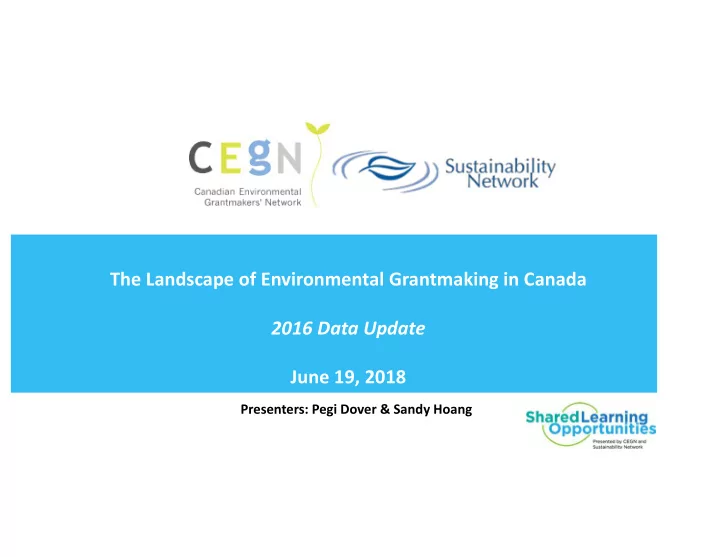

The Landscape of Environmental Grantmaking in Canada 2016 Data Update June 19, 2018 Presenters: Pegi Dover & Sandy Hoang
Presentation Outline § About CEGN § Project Overview and Research Methodology § Key Research Results § Grants Data Alignment with UN Sustainable Development Goals (SDGs) § Opportunities and Next Steps § CEGN’s Online Database Tool § Questions
Project Overview § Providing updates on environmental philanthropy activity is a key activity under one of CEGN’s strategies § Build and Share Skills and Knowledge § Data collection has been ongoing since 2001 and publishing summary reports § 2016 data captured over 3,300 grants, totalling $116.5 million from 105 funders to identify trends and gaps in funding
Methodology § Grant data came from two main sources § Voluntary submissions by funders § Funder websites, annual reports and granting reports § Grants are coded according to 15 broad issue areas, 12 granting strategies, location and keywords § Coding taxonomy is similar to those of our sister affinity groups: § Australian Environmental Grantmakers Network § Environmental Funders Network (United Kingdom) § Environmental Grantmakers Association (United States) § *New*Coded each grant with one UN Sustainable Development Goal
Taxonomy: 15 Issue Areas Keyword tags are used along with our coding taxonomy to pinpoint the issue being addressed in finer detail Examples: “Habitat conservation (Preservation, Protection)” “Urban air quality” “First Nations/Aboriginal/Metis/Inuit/Indigenous Peoples”
Taxonomy: 12 Grantmaking Strategies
Number of Grants and Funding Dollars across Issue Areas
Top 5 Most Funded Issues in Canada Biodiversity and Species Preservation $22,690,768 Costal and Marine Ecosystems Energy $15,282,602 Top 5 Most $9,045,510 Funded Issues Terrestrial Ecosystems Freshwater/Inland Water Ecosystems and Land Use $14,025,673 $13,573,032
Top 5 Most Commonly Supported Strategies in Canada Other: 12% Advocacy Communications & Direct Activity Materials Development Litigation 35% Market Transformation Public Policy/Analysis Stewardship/Acquisition/P reservation Capacity Building Other 11% Top 5 Most Education/Youth Organizing Common 16% Strategies Public Education/ Research (Scientific/Environmental) Awareness 14% 12% `
United Nations Sustainable Development Goals 17 Goals 169 Targets SDG 14 – Life Below Water works to address marine pollution, managing fisheries and protecting marine species and ecosystems, which mirror those in our own issue area of Coastal and Marine Ecosystems . SDG 6 – Clean Water and Sanitation aims at improving water quality, protecting freshwater and water resource management, which aligns with our Freshwater/Inland Water Ecosystems issue area. SDG 15 – Life on Land seeks to protect, restore and promote sustainable use of terrestrial ecosystems, which aligns with our Biodiversity & Species Preservation and Terrestrial Ecosystems & Land Use issue areas.
Funding Distribution and Sustainable Development Goals
As with Atlantic Canada, northern Canada receives a small proportion of funding at only 2.3% in 2016. Geographic Distribution Alberta 8.93% Atlantic Canada Manitoba 1.72% remains one of the New Brunswick 0.87% least funded areas, Newfoundland & Labrador 0.50% receiving only 2.5% Nova Scotia 0.89% of funding since last Northwest Territories 1.01% reported in 2014. Nunavut 0.43% Prince Edward Island 0.23% Quebec 5.69% Saskatchewan 0.68% Yukon 0.84% Ontario 28.04% British Columbia 46.73% Canada-Wide 3.43% British Columbia and Ontario are again the most funded provinces receiving 75% of funding dollars in 2016
Grantmaking Trends from 2011 to 2016 $22.6M $23M Energy Funding $15M Biodiversity & Species Preservation 2011: $23M *New* Top 5 Direct Activity taking the top 2014: $15M most funded strategy spot from Education and 2016: $22.6M Issue Area Youth Organizing
Grantmaking Trends from 2014 to 2016 (Con’t) § 54% increase in grants tagged with our “First Nations/Aboriginal/Metis/Inuit/Indigenous Peoples” keyword tag § Grant sizes ranged from $75 to $2,398,911 § 41% of grants having a value of less than $5,000 (2016) § 46% of grants having a value of less than $5,000 (2014) § Atlantic region and Northern Canada continue to be the least funded areas receiving less than 3% total funding
Opportunities and Next Steps § Opportunities for CEGN members and other funders to bring new knowledge into their funding strategies and decision making § Biannual updates will continue with the next update focusing on grant data from the year 2018 § CEGN will continue to engage with new funders with a view to increasing the scope of our research § CEGN will continue to upgrade our online database platform to better inform our users (members, NGO community, affinity groups)
Access to CEGN’s Online Grants Search Tool Accessible online at: www.grants.cegn.org/ CEGN Members sign in here
Step #1: Select the issue area(s), strategy, location(s) and/or grant years(s) for your search Step #2: View live updates to the summary graphs based on the selected criteria
Sample Search Filter selected * Primary Issue: Climate & Atmosphere Funding Strategy: Communications/media/materials development Location: none selected (note: defaults to search all provinces and territories Year: 2016 Search Results: In 2016, 7 funders granted a total of $400,000 to support their grantees in enhancing communications, media and materials development around climate and atmosphere focused issues. Ontario received $150,000 of this funding Tip: Hover your cursor over the live graphs to see more info.
Questions? Reports available at : www.cegn.org/learn/reports CEGN c/o Foundation House Sandy Hoang (sandy@cegn.org) Pegi Dover (pegi_dover@cegn.org) Tel: 647-288-8891
Recommend
More recommend